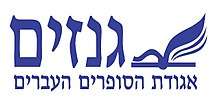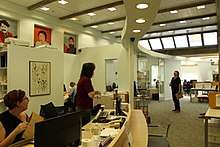Gnazim Archive
Gnazim Archive of the Hebrew Writers Association in Israel (Hebrew: מכון "גְּנָזִים) (founded in 1950) is the largest Hebrew literature archive in the world. It is located in Beit Ariela.
 | |
| Established | 1951 |
|---|---|
| Research type | Hebrew literature archive |
Field of research | Hebrew literature |
| Director | Adiva Geffen |
| Location | Tel Aviv, Israel |
Operating agency | Hebrew Writers Association in Israel |
| Website | http://gnazimorg.startlogic.com/ |


History
The archive was established in 1951 by the Hebrew Writers Association in Israel, at the initiative of the writer and editor Asher Barash. After his death, the institute was named after him.
The purpose of the archive was to assemble and preserve the works of the Hebrew authors who lived and worked in different countries and in Israel. It contains manuscripts, letters, various personal documents and photographs, as well as a unique collection of recordings. It also holds manuscripts and letters of writers who perished in the Holocaust, among them David Vogel, Hillel Zeitlin and Shimon Dubnov. The archives of well-known Yiddish authors, including Zvi Eisenman, Mordechai Tzanin and the archive of David Hofstein, who was executed in the former Soviet Union by Stalin in 1952, are preserved in Gnazim.
Researchers, academics and members of the media from Israel and the world use the archive's treasures for their studies, books or film making.
More than 750 archival collections of writers, poets, essayists and playwrights from the late 19th century to the present, are preserved at Gnazim. Among the literary artists whose archives are kept in Gnazim are Judah Leib Gordon, Shaul Tchernichovsky, Yosef Haim Brenner, Yehuda Burla, Rachel, Esther Raab, Leah Goldberg and Zelda and well-known contemporary writers including Yona Wallach, Avot Yeshurun, Yehuda Atlas, Nachum Gutman and Yonatan Ratosh.
Asher Barash wrote in 1951:
"In due time it will be an archive and gathering place for the entire Jewish creative work, for collecting writings by Jews in any language, first and foremost Yiddish."
References
External links
| Wikimedia Commons has media related to Gnazim Institute archive. |